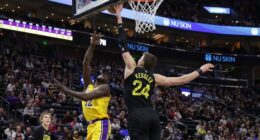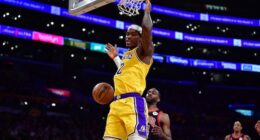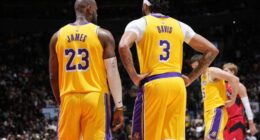Elgin Gay Baylor was born on September 16, 1934 in Washington D.C. Baylor had two brothers, Sal and Kermit, who played basketball so Elgin followed in their footsteps in picking up the game. He played two years at Phelps Vocational High School, but dropped out due to academics.
After sitting out one year, working at a furniture store, Baylor enrolled in Spingarn High School in 1954. In his senior year Baylor was named to the All-Met Team and won the SSA Livingstone Trophy as the area’s best basketball player. He averaged 36.1 points that year and also set a new DC-area scoring record with 63 points in one game.
COLLEGE CAREER
Baylor’s poor academics didn’t allow him to go to college, but a friend arranged for him to receive a scholarship to the University of Idaho. After one year the school fired the head coach and restricted scholarships, forcing Baylor out.
Baylor was drafted by the Minneapolis Lakers in the 14th round of the 1956 NBA Draft while sitting out one year to establish NCAA eligibility in Seattle. Instead of jumping to the NBA Baylor elected to attend Seattle University where he played for two years.
Baylor averaged 31.2 points in those two seasons, leading Seattle to their only Final Four appearance in 1958 where they fell to the Kentucky Wildcats. Despite the loss Baylor was still named Final Four Most Outstanding Player.
LAKERS CAREER
The Lakers would again draft Baylor, this time making him the first overall pick in the 1958 NBA Draft and he would choose to join the team. Baylor immediately established himself as one of the NBA’s premier players.
Baylor averaged 24.9 points (2nd in the NBA), 15.0 rebounds (3rd), and 4.1 assists (8th) in his first season winning NBA Rookie of the Year as well as being named an All-Star, winning All-Star Game MVP, and being named to the All-NBA First Team.
He also changed the fortune of the Lakers franchise, leading them from last place to the NBA Finals where they were swept by the Boston Celtics.
The 1960 season was the Lakers’ last in Minneapolis. Though Baylor was again outstanding, being named an All-Star and All-NBA First Team once again, the team won just 25 games that season. Baylor did set a new NBA scoring record when he dropped 64 points in a win over the Boston Celtics on November 8, 1959.
In the Lakers’ first season in Los Angeles Baylor was outstanding, averaging 34.8 points, 19.8 rebounds, and 5.1 assists. Along with rookie guard Jerry West, Baylor would lead the Lakers to within one game of the NBA Finals, but they ultimately lost in seven games to the St. Louis Hawks.
On November 15, 1960 Baylor established a new NBA scoring record when he scored 71 points to go along with 25 rebounds in a win over the New York Knicks. Only three players have ever eclipsed this mark with Wilt Chamberlain doing so five times, Kobe Bryant’s 81-point game in 2006, and David Thompson scoring 73 in 1978.
The 1962 season may have been Baylor’s most impressive. Baylor averaged a career-best 38.3 points to go along with 18.6 rebounds, and 4.6 assists in 48 games. But Baylor didn’t miss games due to injury, instead he was called into active duty as a member of the US Army Reserves and was only allowed to play while on a weekend pass so he was unable to practice or be with the team during the season.
Despite this, Baylor wouldn’t even finish in the top-3 of MVP voting as this was the same year in which Wilt Chamberlain averaged 50.4 points and 25.7 rebounds and Oscar Robertson averaged a triple-double with 30.8 points, 12.5 rebounds, and 11.4 assists. But the MVP would instead go to Bill Russell who averaged 18.9 points and 23.6 rebounds for the Boston Celtics who won a league-best 60 games.
The Lakers did return to the Finals this season for an epic seven game series with the Celtics. In Game 5 Baylor scored 61 points, still an NBA Finals record to put the Lakers ahead 3-2 in the series. In the deciding Game 7, Baylor finished with 41 points and 22 rebounds, but Russell finished with 30 points and 40 rebounds as the Celtics defeated the Lakers in overtime 110-107.
It was more of the same in the 1963 season as Baylor (34.0 points, 14.3 rebounds, 4.8 assists) and West (27.0/7.0/5.6) put up huge numbers while leading the Lakers to 53 wins and a return to the NBA Finals. But again the team would fall to the Celtics in the Finals, this time in six games.
It was during the 1963-64 season that Baylor began to be plagued by knee issues and many feel he was never quite the same player. Baylor still averaged 25.4 points and 12.0 rebounds, but West took over as the team’s leading scorer. Meanwhile the Lakers disappointed, winning just 42 games and falling in the Western Semifinals to the Hawks.
Baylor would average 27.1 points and 12.8 rebounds in 1965 as the Lakers returned to form. The team won 49 games and returned to the NBA Finals, but their old rivals the Celtics again defeated them in five games.
The 1966 season was Baylor’s worst. Knee issues hampered him mightily as he averaged just 16.6 points and 9.6 rebounds. It was the first year in which Baylor failed to make the All-Star team or First Team All-NBA. But Baylor would step it up in the playoffs.
The Lakers would return to the NBA Finals and once again go head-to-head with the Celtics. Down 3-1, Baylor turned back the clock with a 41 point performance in Game 5 to save the Lakers’ season. They would force a Game 7, but fall 95-93 on the road marking their fourth Finals loss in five seasons.
Baylor returned to All-Star form in 1967, averaging 26.6 points and 12.8 rebounds, also being named All-NBA First Team once again, but the Lakers struggled, winning just 36 games and falling to the San Francisco Warriors in the Western Semifinals.
The Lakers would return as one of the league’s top teams in 1968. Baylor averaged 26 points and 12.2 rebounds while the team won 52 games and mowed through the Western Conference on the way to another meeting with the Celtics in the NBA Finals. But the outcome remained the same as the Celtics prevailed in six games.
The team would trade for Wilt Chamberlain in the following offseason, giving the Lakers a trio of stars in hopes of getting over the hump. Baylor averaged 24.8 points and 10.6 rebounds, being named All-NBA First Team for the 10th and final time of his career.
The Lakers won 55 games setting up another Finals showdown with the Celtics. Heading into Game 7 Lakers owner Jack Kent Cooke infamously placed thousands of balloons in the rafters, infuriating and motivating the Celtics. Baylor finished with 20 points, 15 rebounds, and 7 assists while West dropped a 42 point triple-double, but a late injury to Chamberlain doomed the Lakers and they fell 108-106 in one of the most heartbreaking losses in franchise history.
Baylor’s knee issues severely limited Baylor in 1970 as he played just 54 games. Still he averaged 24.0 points and 10.8 rebounds and was named an All-Star for the final time in his career. The Lakers returned to the Finals, but instead of the Celtics it was the New York Knicks who met them.
West and Chamberlain led the way, but Baylor still put forth a valiant effort averaging 17.9 points, 11.3 rebounds, and 4.7 assists in those Finals. In Game 7 injured Knicks center Willis Reed famously limped on the floor and knocked down a pair of jumpers to start the game. This inspired the Knicks who would dominate in a 113-99 victory.
RETIREMENT
Just two games into the 1971 season, Baylor’s knee finally gave out as he suffered a severe injury and missed the remainder of the season. He tried to return in 1972, but felt he was holding the team back and chose to retire just nine games into the season.
Ironically, upon his retirement the Lakers immediately embarked on a 33-game winning streak and would go on to win their first NBA Championship in Los Angeles. Though he had retired, the Lakers still gave a championship ring.
To this day many consider Baylor to be the NBA’s forgotten superstar and one of the most underrated players of all-time. The Celtics dynasty of that era prevented him from winning an NBA Championship while the individual numbers of Wilt Chamberlain overshadowed his own unbelievable feats.
Even still Baylor retired as an 11x All-Star and 10x All-NBA First Team selection in addition to winning Rookie of the Year in 1959. Baylor’s 61 point game in the 1962 NBA Finals remains a record and he is one of just 18 players in NBA history with 20,000 career points and 10,000 career rebounds.
Baylor was elected into the Naismith Basketball Hall of Fame in 1977 and the Lakers retired Baylor’s no. 22 jersey on November 9, 1983.



